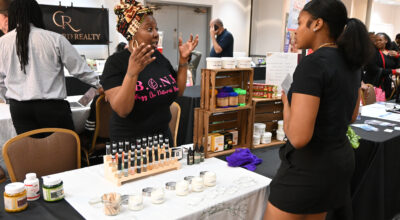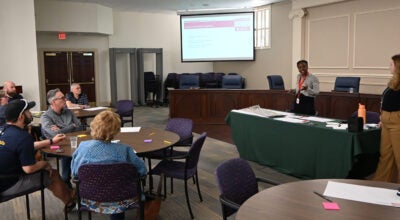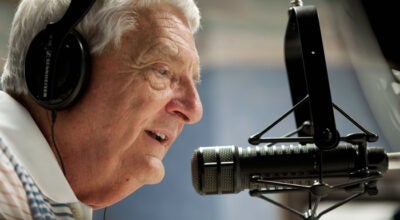Olympic pole vaulter has Salisbury connection
Published 12:00 am Tuesday, July 17, 2012
By Jewell Mayberry
For the Salisbury Post
SALISBURY — Pole vaulting is not a sport that draws a lot of media attention, and certainly not live television coverage from the U.S. Olympic Trials. On the cool, rainy evening of June 28, in Eugene, Ore., as pole vaulter Jeremy Scott competed to achieve the ultimate dream of every track and field athlete, the live television coverage was of lap after lap of the women’s and men’s 5,000 meter finals.
While Jeremy’s wife, Sarah, and his parents, Hank and Rose, watched anxiously from the grandstands, dozens of friends and family around the country stared at the unfamiliar “x” and “o” scoring system of pole vaulting on their computer screens and held their collective breath. With each miss of a competitor, Sarah would send a group text. Jeremy was in second place with a jump of 18 feet, 4[0xbd] inches, but two competitors still had a chance to displace him for the top three.
Tension mounted as family and friends called back and forth to ask what was happening, and then a text from Sarah: “Going to London, baby!”
My husband, David, and I have a special interest in Jeremy’s career. Jeremy, a neuroscience major at Allegheny College in Pennsylvania, met our daughter, Sarah, a communications major at the University of North Carolina at Wilmington, 10 years ago at a beach vault at Wrightsville Beach. They were married five years later at First Presbyterian Church in Salisbury.
They moved to Jonesboro, Ark., for Jeremy to continue his pole vault training with three-time Olympian Earl Bell, and Sarah found a job teaching communications at Arkansas State University. Twenty months ago they became parents to our oldest grandson, Cameron.
‘El Grande’
Jeremy’s had a great career so far. He was the U.S. indoor national champion in 2009 and the outdoor runner-up in 2009, 2011 and 2012. He won the silver medal at the Pan American Games last fall, and he was ranked first in the U.S. and ninth in the world by “Track and Field News” for 2011. (He also has the distinction of being the tallest pole vaulter in the world at just over 6-foot-9, which led to his nickname of El Grande).
However, even with high rankings and top performances, Jeremy is the first to admit that it’s hard to make a living as a professional track and field athlete.
The most obvious issue is income. The United States, unlike many countries, provides no direct support to Olympians. Athletes train, travel to events, and support their families any way they can, usually with part-time jobs and assistance from a spouse or family.
CNN recently reported that only half of U.S. track and field athletes ranked in the top 10 in their event earn more than $15,000 a year from their sport. For the very best in a field, there is prize money and appearance fees, but these are based on how an athlete performs on any given day. The ultimate goal is to sign with a shoe company. Jeremy is sponsored by Nike, from whom he receives his apparel, his shoes and performance-based and rankings-based bonuses.
Time awayfrom family
Another challenge is time away from home and family. Professional pole vaulters spend at least half of the year traveling to competitions. Jeremy has competed in Japan, China, Taiwan, Brazil, Mexico and all over Europe, but this travel isn’t vacation — it’s work. Imagine going through airport security every day for months at a time, waiting for planes, transferring to shuttles or buses, trying to find free wifi to connect to home, negotiating a foreign country to find the event venue, and imagine doing it all while carrying an 18-foot long duffel bag weighing 100 pounds, filled with seven or eight poles and a lifetime of dreams.
Jeremy says being away from home is absolutely the hardest part of his job.
“I’m a homebody anyway,” he says, “but especially now that Cam is growing and changing every day. I’m missing so much.”
Sarah says that it’s also getting harder for Cam to have his dad away. He’s old enough to be aware of Jeremy’s absence, but not yet old enough to understand why. He constantly picks up the phone and says, “Dad-dy?”
‘Not knowing’
Sarah says that for her, the most difficult part of his career is “the not knowing.”
“Not knowing when he’s going to get into a meet. Not knowing how long he might be gone. Not knowing if I can plan on him being at a friend’s wedding next March. Our lives are always up in the air,” she says. “I hate to complain, because I know it’s hard on him too, but in five years we’ve rarely been together on our anniversary, Valentine’s Day, or our birthdays.”
Staying healthy
A final difficulty of making a living as a professional athlete is staying healthy. The NBA, NFL, and MLB notwithstanding, most professional athletes completely lose their livelihood if they have a major medical setback. Jeremy has suffered through an extreme bout of tendonitis in his knee this year, which has kept him from competing in all but a couple of meets and basically from earning any income.
Jeremy will go to almost any lengths to keep his body in shape and healthy. For his knee, he’s had anti-inflammatory injections, stem cell injections and platelet-rich plasma injections. He’s also tried grafton, a bone-graft substitute, massage, acupuncture, laser therapy, ultrasound therapy, magnets and my favorite, a honey and vodka knee wrap. He’s only been home for two days since the Olympic Trials, instead working on his strength training at the Olympic Training Center in California. He’ll miss the Olympic Opening Ceremonies on July 27, staying stateside so that he can continue training.
A few days after the trials, I talked with Jeremy and asked what it meant to him to be an Olympian. Was it worth all the sacrifices, the time away from home, the careers on hold, the training, the injuries?
‘Greatest honorpossible’
Jeremy answered, “It’s the greatest honor possible to wear a uniform that says U.S.A. and have 300 million people pulling for you. I don’t even know how to put it into words.”
He says in the days since the trials, he’s realized the impact that just participating in the Olympics will have on his life.
First, he says that when he travels people always question him about the 18-foot bag of poles. They’ll ask if he vaults for a college, and when he says no, he’s a professional, they always ask, “like in the Olympics?” Now he’ll be able to say yes, just like in the Olympics.
Second, when vaulting is behind him and he applies to medical school, he says he’s always worried that the admissions board will ask what he’s been doing in the years since his college graduation. He says, “Before, I would have had to say, well, I’ve been pole vaulting here and there. Now I can say, I was training for the Olympics.”
And finally, Jeremy says, “Most importantly, no matter what happens, my son will always be able to say his dad was an Olympian. I would say that it’s definitely worth it.”
The pole vault preliminary round is on Aug. 8, and the final round is on Aug. 10. Follow Jeremy’s journey on Sarah’s blog: www.sarahceliac. blogspot.com




